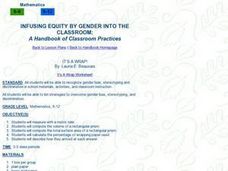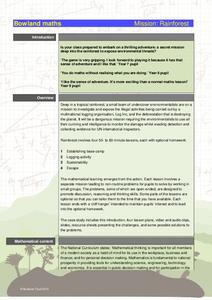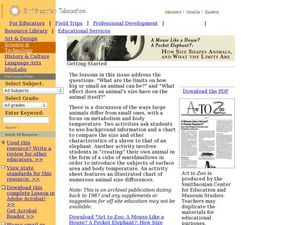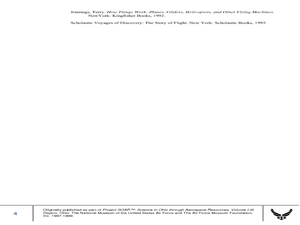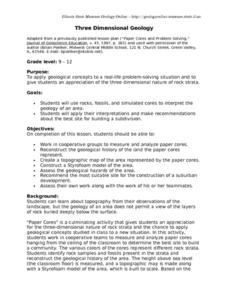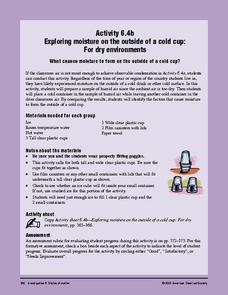Curated OER
Sun, Shadows, Surface Structure...and the Face on Mars
Students use light and shadow information to make inferences regarding the three dimensional shapes of specific objects photographed on the surface of Mars. Limitations of the of the data provided are discussed and entries made into the...
Curated OER
Looking into Surface Albedo
Pupils demonstrate how the color of materials on Earth affect the amount of solar energy that is absorbed. For this solar energy lesson students complete a lab to explore how the color of materials on the Earth's surface impacts warming.
Curated OER
Finding the Circumference and Area of a Circle
Sixth graders discover what circumference is. In this measurement lesson, 6th graders identify the radius and diameter of different circles. Students discover how to find the area of a circle using the radius and diameter.
Curated OER
Mathematics: It's a Wrap!
Students calculate the amount of wrapping paper needed to wrap boxes. They describe how they determined their answers.
Curated OER
Aquifers and Recharge Areas
Students create a model of an aquifer and describe how an aquifer works. They describe how running affects an aquifer and prepare a model presenting to local planners the important aspects of protecting recharge areas.
Bowland
AstroZoo
Rescue animals in the zoo by applying math concepts. Groups of learners solve three missions involving oxygen, food, and climate control. Each group selects an animal from one of four bio-domes.
Bowland
Mission: Rainforest
Young environmentally conscious mathematicians solve a variety of problems related to the central theme of uncovering illegal logging activities. They determine a base camp based on given constraints, investigate logging activities and...
K20 LEARN
Transpiring Trees: Plant Transpiration and the Water Cycle
Looking for a tree-rific addition to your water cycle unit? Teams of young foresters examine the role of transpiration in the water cycle through a week's worth of activities. Pupils analyze how trees take in and transport water during...
DiscoverE
Foil Boats
How many pennies can an aluminum foil boat hold? That is the challenge in a collaborative activity designed to explore the concept of buoyancy. Learners use aluminum foil to build makeshift boats and test the weight they hold before...
Curated OER
Seismic Waves
Students identify the four types of seismic waves, their characteristics and effects. Then they predict the level of damage each wave might cause in a residential area and test their predictions against several computer animations. ...
Curated OER
Playground Measurement
Fifth graders find a rectangular or square object in the classroom to measure. They measure to the nearest centimeter and apply that knowledge to measuring perimeter. They recognize, describe, and determine surface area and volume of...
Curated OER
How Size Shapes Animals
Students investigate how size affects large and small animals differently. In this animal lesson plan, students determine how size affects different animals by constructing their own animal out of marshmallows. Once students create...
Curated OER
Searching for Meanings Beneath the Surface of the Poem
Young scholars analyze poetry. For this cultural perspectives lesson, students read the poem "Soccer Until Dusk" by Mark Brazaitis. Young scholars analyze the poem and consider the cultural perspective it reveals.
National Wildlife Federation
Ghost Town
Around 93 percent of the reefs on Australia's Great Barrier Reef have been bleached, and almost one quarter of them are now dead. Scholars research the sea temperatures, especially around the areas with coral reefs, to make connections...
Curated OER
Parachutes: Is it Surface Area or Shape?
Young scholars investigate how to make a good parachute. In this physics activity, students observe the motion of parachutes as it falls and measure the time. They collect data and calculate the average descent time for each canopy shape.
Curated OER
Three Dimensional Geology
Here is a fine lesson plan on geology designed for high schoolers. Learners use rocks, fossils, and other geological clues to determine the geology of an area. Then, they make recommendations to a fictitious city council about the...
National Wildlife Federation
I’ve Got the POWER! Solar Energy Potential at Your School
Should every school have solar panels? The 19th lesson in a series of 21 has scholars research the feasibility of using solar panels at their school. They begin by gathering data on the solar energy in the area before estimating the...
Curated OER
On the Surface
Students draw and label the 15 major rivers in Texas. They then draw and label another map with the major lakes and reservioirs of Texas. Students use the maps and locate and label the location of the following major Texas cities:...
National Wildlife Federation
Quantifying Land Changes Over Time Using Landsat
"Humans have become a geologic agent comparable to erosion and [volcanic] eruptions ..." Paul J. Crutzen, a Nobel Prize-winning atmospheric chemist. Using Landsat imagery, scholars create a grid showing land use type, such as urban,...
Alabama Learning Exchange
Pennies, Pennies and More Pennies
Learners determine the number of pennies needed to fill a room. For this pennies lesson plan, students work in groups to determine the number of pennies needed to fill a room. They compute the probability of the head of a pin landing...
Curated OER
Regents High School Examination: Living Environment 2005
The 2005 version of the Regents High School Examination in the area of ecology is as comprehensive as previous years' exams. It consists of 40 multiple choice questions on everything from the structure of DNA to the interactions within...
Curated OER
Winter-time Temps
Students measure temperature and become aware the the temperature above and below the snow is different. In this winter temperature lesson, students measure temperatures to find variation based on how the snow is packed. Students create...
American Chemical Society
Exploring Moisture on the Outside of a Cold Cup: For Dry Environments
If the area you live in is arid, or the preceding experiment in this unit didn't yield obvious results, use this one in place of it to help reveal where condensation comes from. The mini unit that this is part of a comprehensive...
American Chemical Society
Why Does Water Dissolve Sugar?
Did you know that if you wait long enough, the M on the outside of an M and M will float to the surface when submerged in water? Learners observe the sugar coating of an M and M while it is dissolving in water. They explain how this...
Other popular searches
- Surface Area and Volume
- Surface Area and Net
- Cylinder Surface Area
- Surface Area of Prisms
- Surface Area Volume
- Surface Area of Cylinders
- Finding Surface Area
- Surface Area Cone
- Surface Area Volume Cylinder
- Surface Area Lesson
- Cylinder Surface Area Nets
- Lateral Surface Area





